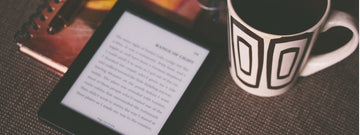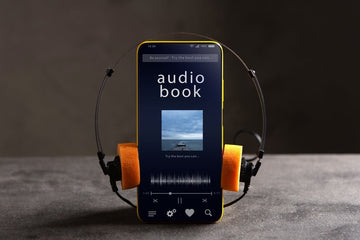
Though they’ve been around for over 40 years, audiobooks are becoming more popular now than ever before.
There’s never been a better time to get invested in audiobooks as a reader, writer, or even as someone who just loves great entertainment.
Audiobooks are becoming popular because they are the ideal medium for the busy reader. They are a convenient and stimulating way of getting everything out of a book without having to dedicate 100% of your attention to reading.
When did audiobooks get started?
Audiobooks have a shorter history than most people would expect.
Although audio recording is well over a hundred years old, and everyday people have been enjoying recordings of music in their homes since roughly the 1930s, audiobooks didn’t really enter the scene until the 1970s.
Their slow adoption has more to do with the technical challenges of recording an audiobook. Demand might have existed early, but for decades there was no cost-effective way to produce an audiobook.
Before the 1970s vinyl was the primary medium for storing recorded audio. Records are expensive to produce, and they can’t hold very much audio.
A standard 12-inch 33rpm record can hold, at most, 22 minutes of audio per side.
The average audio book is 11 hours long. That means an average-length book would take up 15 records, and others could take up 30 or 40.
Publishers couldn’t afford to produce audiobooks.
Even if they could, vinyl is so heavy that storing audiobooks would have been an incredible pain for stores and consumers. For reference, that 11-hour audiobook pressed into vinyl would weigh about 5 pounds.
Cassette tapes, which were invented in 1962, changed everything. Cassettes are compact, light, and, best of all, cheap to make.
Because of that, publishers slowly began producing audiobooks on cassettes for the Library of Congress.
In the 1970s, cassette tapes were brought to the mass market. Cars started to be manufactured with cassette decks as a standard, and the Walkman came out, offering people a convenient way to listen to their cassettes on the go.
With the means to produce and mass distribute audiobooks now readily available, publishers finally started to take an interest in the concept. People loved audiobooks when they first arrived on the market, and their popularity has continued to increase.
Through the 1980s audiobook publishing became its own industry. In 1986 the Audio Publishers Association was formed, and it has been working to spread the appeal and improve the quality of audiobooks ever since.
The internet transformed the audiobook industry just as fundamentally as it changed the traditional book publishing industry.
As cassettes had done before, the internet made producing and distributing audiobooks infinitely cheaper.
Nowadays audiobooks are available in countless formats. They’re available from professional publishers and amateur enthusiasts alike. It’s never been easier than it is right now to make and consume audiobooks.
Why are audiobooks becoming popular right now?
Audiobooks have been steadily gaining popularity since they were first published in the 1970s. Books, in general, have been steadily declining in popularity for the same length of time.
Today people have access to endless varieties of entertainment. There’s streaming services, TikTok videos, and virtual reality video games available at a moment's notice.
At the same time, audiobooks are suddenly seeing an even steeper jump in popularity.
Why is it that in 2021, with all the entertainment options out there, people are buying audiobooks in droves?
1. Mass Media
Part of the explanation has to do with people’s attitudes towards the media. As trust in mass media starts to decline, people want to do their own research and learn as much as possible for themselves.
Books have always been the best way to learn new information. Modern life hasn’t changed that, but it’s made finding time to read more difficult than ever.
Audiobooks offer people the opportunity to gain all the benefits of self-education through reading without requiring they give up hours sitting down with a print book.
2. The Pandemic
Of course, with the Covid-19 pandemic, there’s more time to sit down and read than ever before, right? Not necessarily.
Even though many people have transitioned to working from home, they’re finding that work keeps them as busy as ever.
What is actually new is the ability to do something like listen to an audiobook while working. There’s no office mates to complain about the noise, and there’s no boss interrupting the most enthralling moment of a chapter.
Throughout the pandemic more and more people have been discovering audiobooks. That's why 2020 audiobook sales set industry-wide records.
3. Accessibility
An audiobook’s main appeal has always been its accessibility. '
Audio makes books accessible to all sorts of people who wouldn’t otherwise be able to learn from them. Almost anyone can listen to a story, and audiobooks are even available on-the-go.
Modern technology has made audiobooks more accessible than ever. There are now countless ways to listen to audiobooks and even more ways to obtain them.
Tapes and CDs, believe it or not, still exist.
But there’s computer and phone downloads, platforms like Audible, and even podcasts that are serialized audiobooks. All of this means that more and more books are becoming available in audio format.
Now, anyone who wants just about any book ever printed can now get it in audio somehow.
Are audiobooks more popular than physical books?
While their popularity is skyrocketing, audiobooks haven’t overtaken physical books yet.
The Pew Research Center studied the popularity of books in 2019. Based on their research, non-print formats still have quite a bit of catching up to do.
The study found that 65% of adults in the US had read a book in the last year, while only 20% had listened to an audiobook. What was especially interesting was the finding that 28% of people had done both.
The Pew data only shows one part of the picture. While there’s still a large gap in popularity between audio and print books, the audiobook market is growing much, much more quickly than print.
US audiobook sales in 2020 generated 1.2 billion dollars in revenue, which is 16% more than in 2019. Even more surprising than that, in 2020 audiobook sales finally overtook ebook sales.
All of this seems to point towards audiobooks consuming more and more of the publishing market over time. There’s a good chance that in 10 years the data on print versus audio readership will look dramatically different.
Does listening to an audiobook count as reading?
This is a question that comes up all too often when people start talking about audiobooks. As with everything, there are two passionate schools of thought.
Diehard fans of traditional, print books will say that audiobooks do not count as reading. They will claim that audio doesn’t give the same experience as “real” reading, and people retain less of the information when they listen.
They’re wrong, as countless studies have shown that there is no definitive difference in comprehension between visual and audible learning. What matters is the amount of attention given to the story, and it is true that most people listen to audiobooks without giving them 100% of their attention.
The anti-audio argument is also inherently ableist.
To claim that only print reading “really counts” explicitly discounts the experience of people who actually can’t read print. Some of the greatest works of literature, like John Milton’s Paradise Lost, have been “written” through audio dictation by blind authors.
Of course, many more people understand that listening to an audiobook is just as valid as reading a print book. Both methods “count” as reading, though individual experience of each may vary.
Listening to an audiobook while driving might be perfectly fine for some, while others will struggle to absorb what they’re hearing. The best rule of thumb is to do whatever feels best to you.
Best platforms to buy audiobooks
1. Audible
Audible is the largest, most well-known platform for buying audiobooks.
For a monthly fee to Amazon, you get two free “Audible Originals” every month and discounted access to their entire catalog. Don’t worry about cancelling your membership — you’ll retain access to your books.
Audible has a 30-day free trial, and you’ll get two free audiobooks just for checking it out.
2. Google Audiobooks
Most people listen to audiobooks on their cell phone. Google Audiobooks is a super-slick app and digital store for audiobooks.
Google has a massive library of audiobooks that are yours to keep after purchase.
The app is also available on iPhone and works much better than buying audiobooks through Apple’s platforms.
3. Scribd
If you want a monthly service outside of the Amazon ecosystem that also gives you a better deal for your money, Scribd is your friend.
While not as impressively funded as Audible, Scribd has a large library of audiobooks, ebooks, and even sheet music.
Scribd also offers a 30-day free trial, and you’ve got nothing to lose by checking it out.
4. Ask the Author
Here’s something most people don’t consider. Authors sometimes sell their material directly, and buying from an author gives them more financial support than buying from their publisher.
While directly available audiobooks will come as an audio file and not linked to a specific application, that actually gives you more freedom with how to play the audiobook.
Before buying elsewhere, take a look at the author’s website to see if they sell directly.





